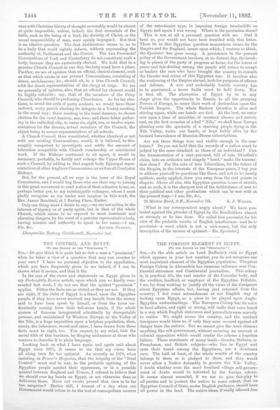THE CONTROL AND EGYPT.
[TO THE EDITOR OF THE "SPECTATOR."]
SIR,—Do you think it is quite fair to dub a man a "pessimist," when he takes a view of a question that may run counter to your own P I have no personal objection to the appellation, which you have frequently given to me indeed, if I can be shown what it means, and that it fits.
In the case of the views and statements on Egypt given in my Fortnightly Review article, upon which you so kindly com- mented last week, I do not see that the epithet " pessimist " applies. Either the facts are as stated, or they are not. If they are right, if the Debt of Egypt is a fraud upon the Egyptian people, if they have never received any benefit from the money said to have been spent by Ismail, or from the taxes un- doubtedly coming from their toil-worn hands, if the whole system of finances inaugurated admittedly by disreputable persons, and maintained by Western Europe, in the Valley of the Nile, is a huge imposition upon a helpless population, then, surely, the inferences, moral and other, I have drawn from these facts must be right, too. You cannot, to my mind, hide the moral filth of this business, by flinging nicknames at those who venture to describe it in plain language.
Looking back on what I have again and again said about Egypt since 1875, it seems to the that my views have all along been far too optimist. As recently as 1879, when insisting, in Fraser's Magazine, that the iniquity of the "Dual Control" must end in war, in the probable uprising of the Egyptian people against their oppressors, or in a possible quarrel between England and France, I refused to believe that we should ever lay hands on Egypt, or act otherwise than as deliverers there. Have not events proved that view to be far too sanguine P Earlier still, I dreamt of a day when our Government would refuse to be the tool of cosmopolitan usurers of the extortionist type, in imposing foreign banabailiffs on Egypt, and again I was wrong. Where is the pessimism there!)
This is not at all a personal question with me. Had it been so, you would not have been troubled with this letter. There lie in this Egyptian question momentous issues for the Empire and for England, issues upon which, I venture to think, the Spectator has gone wrong. A persistence in the present policy of the Government involves, at no distant day, the break- ing in pieces of the party of progress at home, for the lovers of peace and fair-dealing among the people will refuse to accept as leaders the men who have brought the country to commit the blunder and crime of this Egyptian war. It involves also. the weakening of the Empire abroad, both for purposes of offence and defence. A new and undeniably hostile country has to be garrisoned, a lesser India must be held down. Nor is that all. The absorption of Egypt by us in any shape gives the opportunity to Russia, to all the grasping Powers of Europe, to renew their work of destruction upon the Turkish Empire. The whole Eastern Question is alive and stirring again, while our hands are tied. At the best, we enter now upon a time of anxieties, of constant alarms and unrest, and, on the first occasion of a bad "Nile," we shall have Europe gloating over the spectacle of a starving people dying in the Nile Valley, under our hands, or kept feebly alive by the
benevolence of Mansion-House subscriptions.
Are not these things true and visible enough in the near future ? Do you not hold that the records of a nation must be- judged by the same standard as those of an individual Can the transmutation of a cent-per-cent. bill of sale, Skinflint's claim, into an orthodox and shapely "bond," make the transac- tion clean ? For the sake of true Liberalism, for the future of the Empire, in the interests of the European peace, I beg you to address yourself to questions like these, and not to let handy epithets, easily applied, draw you away from the real points in dispute. Above all else, this Egyptian question is one of morals, and as such, it is the sharpest test of the faithfulness of men to their political and other professions which can be met with at the present am, Sir, Sze., 70 Hinton Road, SE., November 7th. A. J. WiLsox.
[What is our correspondent angry about ? We have pro- tested against the plunder of Egypt by the Bondholders almost as strongly as be has done. We called him pessimist for his view of the probable results of English interference—and he ia pessimist—a word which is not a nick-name, but the only description of the reverse of optimist.—ED. Spectator].






































 Previous page
Previous page